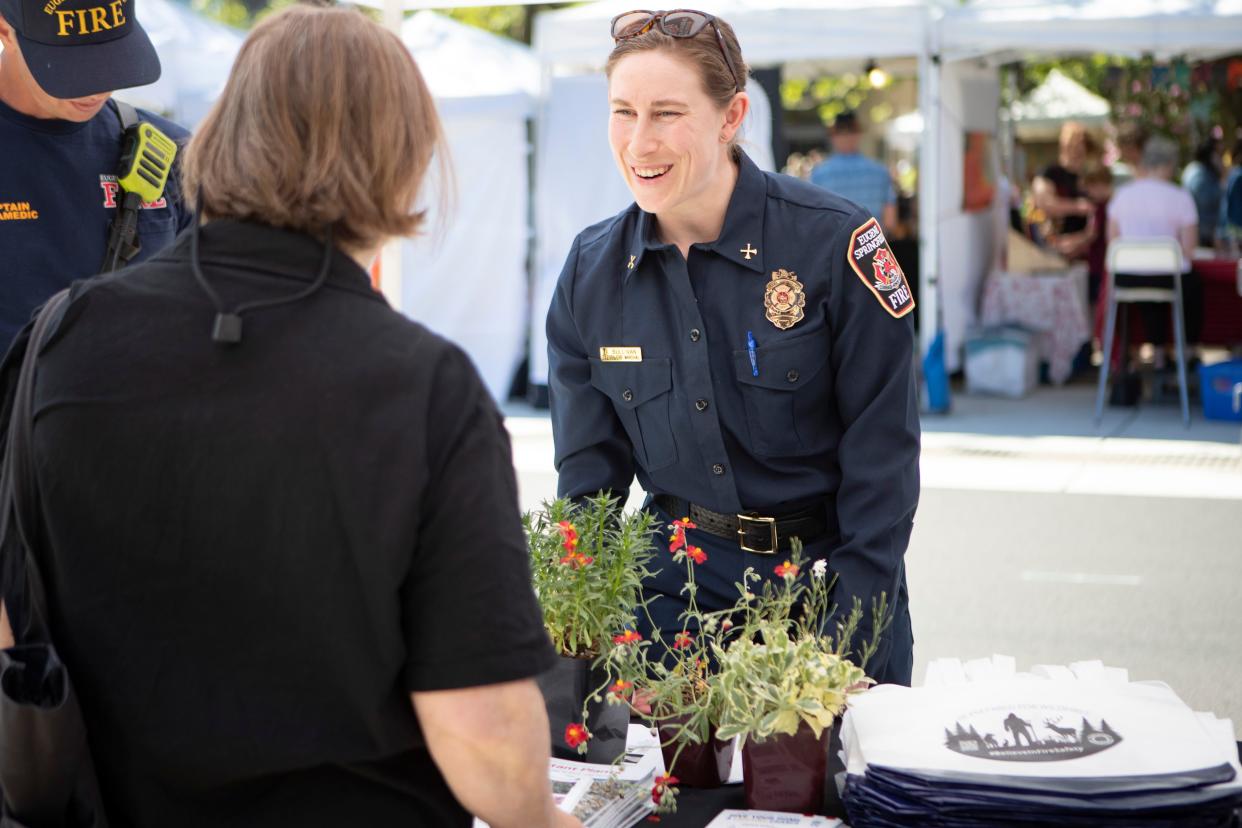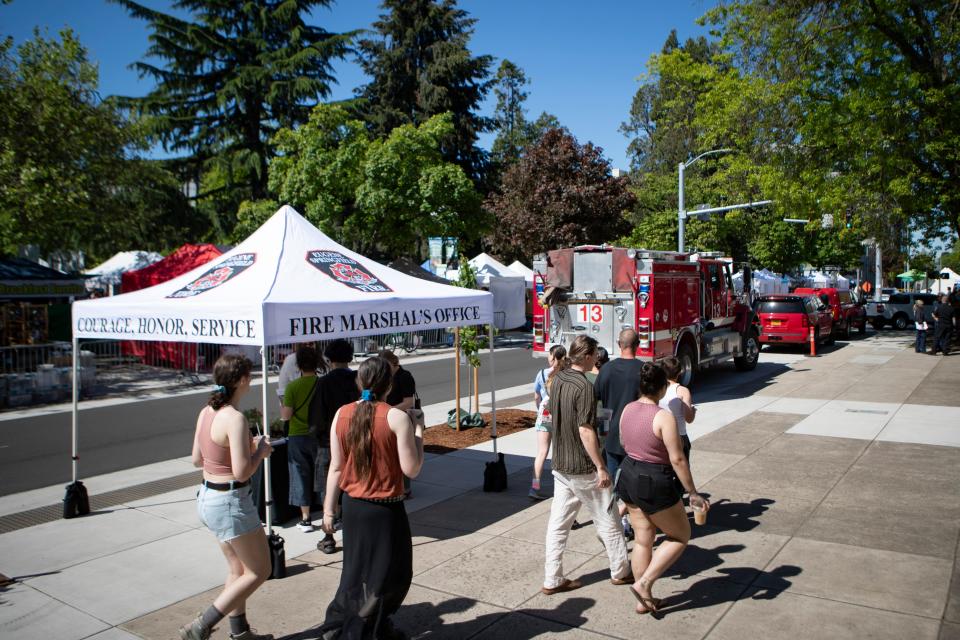What Oregon firefighters say you should do to prepare for this wildfire season

Wildfire season is fast approaching and Lane County area fire officials are urging residents to do what they can to prepare themselves.
May is National Wildfire Awareness Month and representatives with the Eugene Springfield Fire Department have been on hand at several public events to raise awareness about wildfires and fire adapted communities.
"Becoming a fire adapted community starts with all of us," Deputy Fire Marshal Althea Sullivan said. "It takes all of us recognizing that wildfire is something that can and does occur and that we all have a part to do in being prepared, whether that's being prepared around our homes, being prepared as individuals, or just making really smart choices during the summer months when we have a really high potential in our community."
To address the increasing risk of wildfires and their impacts on communities, the Eugene Springfield Fire Department is launching a Wildfire Planning and Fuels Management Program funded by the Community Safety Payroll tax, which provides funds to five service areas in the City of Eugene.

Sullivan is set to lead the program along with the Community Risk Reduction and Resiliency Division at Eugene Springfield Fire.
"That program is intended to expand our capacity as a fire agency to address the risk of wildfire in our community," Sullivan said. "From the planning aspect of that, what we're looking into is the highest risk areas of our community and we're looking at how we can help begin to mitigate some of those risks in those areas while also thinking about how we can improve our response and access."
The Wildfire Planning and Fuels Management Program will align with statewide priorities outlined in Senate Bill 762 to modernize wildfire preparedness, implementing three primary strategies including the creation of fire-adapted communities, developing safe and effective response, and increasing the resiliency of Oregon's landscape.
Key program objectives include the expansion of public outreach and engagement, increase in fuels management capabilities in Eugene and Springfield, and the development of comprehensive fire-adapted community plans, which Sullivan says the department is in the process of creating.
Representatives with Eugene Springfield Fire Department will be at the Lane County Farmers Market on May 18 from 9 a.m. to 12:30 p.m., and at the Eugene Saturday Market from 10 a.m. to 12:30 p.m. on May 25 to provide information to the community about Wildfire Awareness Month.
How to prepare for wildfire season
According to the Oregon Department of Forestry, over seventy percent of wildfires in Oregon are human-caused and debris burning is the number one culprit.
"Now is the time to trim trees, bushes, and tidy up plants around your home to create a 'defensible space' around your property," said the department in a press release.
Fire prevention specialists in Oregon ask people to abide by the following safe burning practices:
Call before you burn - Burning regulations vary by location depending on the weather and fuel conditions. If you are planning to burn, check with your local ODF district, fire protective association, fire department, or air protection authority to learn about current burning restrictions or regulations, and if you need a permit.
Know the weather - Burn early in the day and never burn on dry or windy days, because fire can spread out of control more easily.
Always have water and fire tools nearby - When burning, have a charged water hose or a bucket of water, and shovel on hand to put out the fire. Drown the pile with water, stir the coals, and drown again, repeating until the fire is cold to the touch.
Clear a 10-foot fuel-free buffer around the pile - Make sure there are no tree branches or power lines above.
Keep burn piles small - Large burn piles can cast hot embers long distances. Keep piles small, maximum of four feet by four feet. Add debris in small amounts as the pile burns.
Burn only yard debris - State laws prohibit burning materials or trash that create dense smoke or noxious odors.
Never use gasoline or other flammable or combustible liquids to start or speed up your fire.
Stay with the fire until it is cold - NEVER leave your debris burn unattended. State law requires monitoring of debris burn piles from start to finish until it is out cold. This law is intended to ensure sparks or embers that jump from the fire can be put out quickly.
Go back and check burn piles. Theyc an retain heat for several weeks and restart when the weather warms up and wind blows.
Costs of run-away debris burns - State law requires the proper clearing, building, attending and extinguishing of open fires all year. If your debris burn spreads out of control, you may have to pay for suppression costs, as well as the damage to your neighbors' properties, which can be extremely expensive.
Where to get alerts, plans for local emergencies
Residents can sign up for emergency alerts and review evacuation plans online at the Lane County Emergency Management Webpage.
The webpage also features a 12-week preparation checklist that breaks down the elements of an emergency kit in case of a catastrophic natural disaster such as a wildfire, flood or ice storm.
Stages of evacuation
Lane County and state officials communicate to residents when to prepare and when to leave their homes in an emergency.
There are three levels of evacuation notices that residents may receive in case of an emergency, according to Lane County:
Level 1 - BE READY: You should be aware of the danger that exists in the area, monitor emergency services websites and local media for information. This is the time to prepare for the movement of people with special needs, mobile property and pets and livestock. If conditions worsen, emergency services personnel may contact you via an emergency notification system.
Level 2 - BE SET: You must be prepared to leave at a moment's notice. This level indicates there is a significant danger to your area. You should either voluntarily relocate outside of the affected area or, if choosing to remain, be ready to evacuate at a moment's notice. You may have to gather necessary items, but doing so is at your own risk.
Level 3 - GO: Leave immediately. Danger to your area is current or imminent and you should evacuate immediately. If you choose to ignore this advisement, you must understand that emergency services may not be able to assist you further. Do not delay leaving to gather personal belongings or make efforts to protect your home. This will be the last notice you receive. Entry into evacuated areas may be denied until conditions are safe.
Fire evacuation checklists
The U.S. Forest Service offers a checklist of what to plan and have ready to take with you and what to do when having to evacuate for a wildfire. Working to gather the items and information before an emergency is key, as evacuation notices can come quickly, giving people little time to prepare in the moment.
Gather in advance and store in a secure place that is easily loaded into a vehicle, so you're ready to evacuate quickly:
Complete written phone list or phone address book (snail and email), including cellphones of neighbors, family
Very important files, backup disks, plug‐in USB virtual drive, small compact file box. Include such things as homeowner’s policy, auto policies, life and investment files, bank records, legal documents, licenses, birth certificates, etc. (or store in a fireproof safe or fireproof bunker)
Pet carriers, leashes, food bowls, food, litter boxes, litter and other pet needs.
Photograph albums, photo CDs and other keepsakes that cannot be replaced (or store in a fireproof safe)
Suitcase filled with old but useable clothing, socks, underwear, jackets, sweatshirts, extra shoes, etc. Keep this packed ahead. Include a bag for him and for her of toiletry items, including: deodorant, disposable shavers, extra toothbrushes, shampoo shaving cream, toothpaste, extra regular medications to last a few days
Infant formula and diapers and toys for children
Flashlight, portable radio, extra batteries
First aid kit
Water
When evacuation seems a possibility, get these things ready:
Have at least a half tank of fuel in your vehicle at all times.
All household and car keys, wallet, handbag, cellphones, chargers and any credit cards you that you might need.
Cash, in case you cannot use credit or debit cards
Round up your pets: Get them secured and ready to go into the car with no way of escape before they are loaded into the car (this is especially important with cats).
Make a prior arrangement to contact a neighbor or friend who might be available to help you in an evacuation situation with loading or driving a second or third vehicle, or to help with large animals such as horses/penned animals, etc.
Personal computer. Computer CPU (hard drive) is most important if you have no back‐ups.
Bottled water
Map of the area and evacuation routes
If time, draft email, send to friends and family about your intentions (where you plan to go, how to get in touch with you)
Before you leave your home:
Close all windows, close all interior doors, remove curtains from area of windows.
Turn off propane gas at tank, remove BBQ propane tank, take it with you or store in a secure place such as a bunker or away from your house.
If you have time, experts suggest turning on sprinklers and turning off your main gas line.
Haleigh Kochanski is a breaking news and public safety reporter for The Register-Guard. You may reach her at HKochanski@gannett.com.
This article originally appeared on Register-Guard: What Oregon firefighters say you should do to prepare for wildfires

